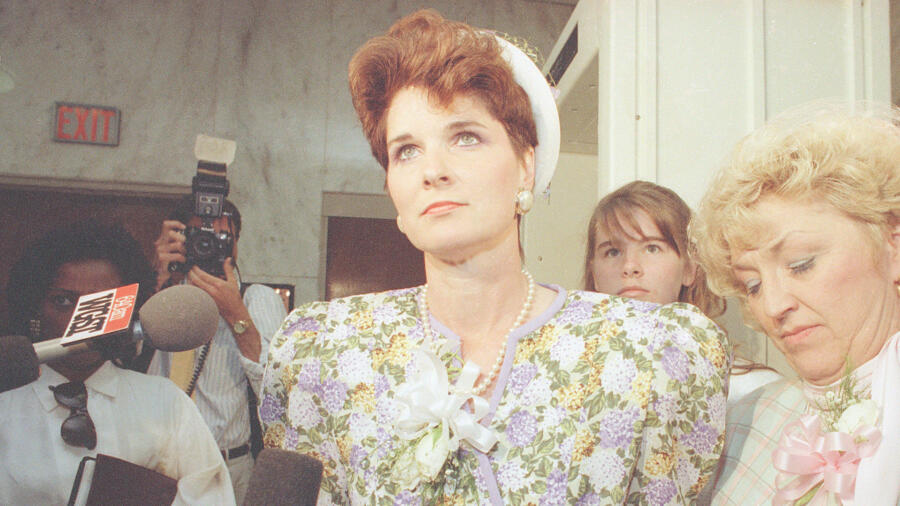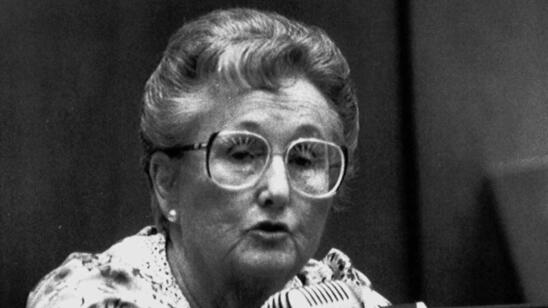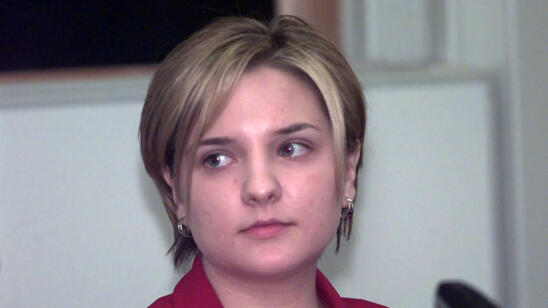For many years, Faye Yager ran an underground network out of her Atlanta, Georgia home in order to hide children who’d allegedly been abused.
To her defenders, she acted nobly, bucking a justice system that had failed children by giving custody to their abusive parents, typically fathers.
To her critics, her actions amounted to kidnapping and vigilantism, and were detrimental to the children she wanted to protect.
Yager, now in her 70s, gained media attention in the 1980s as she publicly discussed what became known as her “Children of the Underground” network, reportedly made of people connected to domestic violence shelters, women’s groups and even former nuns, according to a 2016 article in Newsweek.
[Stream episodes of American Justice in the A&E App.]
“Every time I hide one, I feel like I’m up one on the system,” Yager told Florida’s Sun Sentinel newspaper in 1989. “One more kid they don’t get their hands on. And I double-dare them to come after me.”
Yager stepped away from the spotlight in 1999 after a $100 million lawsuit was brought against her by a Philadelphia millionaire whose children were taken abroad by his ex-wife, Newsweek reported.
Yager, who now runs an inn in North Carolina and didn’t return requests for an interview from A&E True Crime, told Newsweek in 2016 that she and the network were “as busy as ever.”
How Families Went Underground
Defying court custody orders, the network’s members assisted non-custodial parents, mostly mothers, to hide and protect their children from alleged abuse by the other parent. Yager told multiple media outlets that she’d helped more than 1,000 children over the years.
The network wouldn’t take children without a guardian’s involvement, she told the Detroit Free Press in 2011. Families often worked with planners months in advance before children went into hiding; once on the run, children often were given new names and forged identification papers, she told the Minneapolis Star Tribune in 2015.
The most high-profile case involved millionaire Bipin Shah, who was featured on the cover of Time magazine in May 1998 after offering a $2 million reward for the return of his two young daughters. Shah eventually found them at their mother’s home in Switzerland and brought them back to the United States.
The girls’ mother, Shah’s ex-wife, said she’d been physically abused by Shah—which he denied—and never accused him of abusing their daughters, the Pittsburgh Post-Gazette reported. Shah dropped his $100 million lawsuit against Yager after he found his daughters.
Faye Yager’s Life and Personal Battles
A native of West Virginia who was among 11 children of a coal miner, Yager married her first husband, Roger Lee Jones, at age 17 in 1966, according to The Philadelphia Enquirer. They divorced six years later, after Yager accused Jones of molesting their daughter in their Atlanta home.
The girl tested positive for gonorrhea at age 4, but the evidence did not come in time for the court hearing, the Sun Sentinel reported. Custody of the girl was awarded to Jones. Though Yager made a number of appeals, she never got her daughter back. The girl eventually ended up in a mental hospital, Yager told the newspaper.
“He got away with it,” said Yager, who later married Atlanta physician Howard Yager. “I could kill him.” Years later, Jones was charged with sexually molesting other children. He landed on the FBI’s Ten Most Wanted list and was arrested in 1989.
The underground network began in 1987, after Yager read about a Mississippi case involving a woman, Karen Newsom, who lost custody of her two children after she accused her husband of sexually abusing them, the Sun Sentinel reported.
In 1987, Yager also co-founded the group Mothers Against Raping Children, later known as Mothers Alliance for the Rights of Children. Co-founders Sarah King and Denise Gooch eventually asked her to leave the group, according to a 1990 article in South Carolina’s Herald-Journal.
“Once she started doing the media, it seemed like there was some gross exaggeration—things that just weren’t happening, numbers that just weren’t there,” King told the newspaper. “We didn’t want to focus on the underground railroad. We wanted to focus on how to make the system better.”
In 1990, Yager was arrested and faced charges of cruelty to children, kidnapping and interference with custody in Cobb County, Georgia, stemming from her conduct with two children whose mother was fleeing an abusive husband, The New York Times reported. The children said Yager coerced them into fabricating stories of abuse; the evidence included tapes of Yager questioning them and others.
Yager was acquitted of the charges in 1992. “There was little clear evidence either of harm or of malicious intent, which was part of the state’s burden of proof,” the newspaper wrote.
Like many of her critics, Cobb County District Attorney Tom Charron described Yager as someone with “good intentions” who nevertheless “had become obsessed,” according to the Los Angeles Times.
Calls for Investigation
Over time, Yager started pointing the finger at “a shadowy, satanic brotherhood” that “manipulates the nation’s courts, haunts the police and allows children to suffer unspeakable evil,” the Los Angeles Times wrote in 1990.
Yager’s media appearances included a 1989 episode of the daytime talk show Geraldo titled “Mothers Running from the Devil.” In the episode, journalist and host Geraldo Rivera interviewed Yager and some of the parents and children she had helped via her underground network. Several mothers, and two fathers, claimed on the show that their children had been victims of rape and violent ritual abuse, and had been forced to participate in bloody animal sacrifices and even the killings of other children. Rivera also questioned some of the children
While acknowledging that skepticism about the allegations might be warranted, Rivera called for “a full-blown congressional investigation.” Among supporters of Yager’s cause is Amy Neustein, who co-wrote the book From Madness to Mutiny: Why Mothers Are Running from the Family Courts—and What Can Be Done About It.
Neustein tells A&E True Crime she met Yager around late 1987, after she was going through her own family ordeal related to child custody and alleged abuse.
She and Yager appeared on talk shows and traveled together, and last spoke around 2005, Neustein says. They shared the belief that children across the country are victimized by family court systems and exploited by a widespread child pornography ring, she says. Neustein added she continues to believe that and hopes the U.S. Attorney General will launch an investigation.
“So many mothers are losing their children to abusers,” Neustein says, “and they are treated worse than criminals. They get no vindication.”
Yager was “singularly focused “ and had an animated, sharp intelligence that captivated even strangers, Neustein says.
“I was certain this woman was going to make the history books,” she says.
However, Yager’s flamboyant, even theatrical, personality hurt her cause, Neustein says. “Was she the best messenger? No,” she says. “I think what happened was that people became diverted by the personality, and they forgot the message.”
Dangerous Consequences to Yager’s Actions
Most studies find that only 1 percent to 6 percent of all child sexual abuse allegations in custody and visitation disputes are maliciously fabricated; the rest are either true or made in good faith, according to a fact sheet shared by the nonprofit Center for Judicial Excellence.
The National Center for Missing & Exploited Children (NCMEC) has long been critical of Yager and her underground network.
Angeline Hartmann, NCMEC director of communications, tells A&E True Crime the agency believes in working within the legal system and relying on experts to interview and assess all sides whenever children’s well-being are at stake.
“People often have good intentions…but when you kidnap children, you’re interfering with the legal process—and that’s not OK,” Hartmann says. “Whether it’s Faye Yager or any other organization, we are against that.”
Of the 27,733 of children missing in 2021, 90 percent were endangered runaways, followed by fewer than 5 percent, who were missing due to family abduction, according to NCMEC data.
People tend to believe that children are OK if they’re with a parent, but that’s not always the case, Hartmann says. “Cases where children are missing as part of a domestic dispute can be one of the most volatile and dangerous scenarios out there,” she says.
For example, kidnapped children often aren’t enrolled in school, don’t get adequate nutrition and housing and don’t receive medical or dental care, she says. Plus, “we don’t know what they are being exposed to,” she says.
So what if the legal system fails to protect children?
“We need to go through the system in order to make improvements,” Hartmann says. “When you’re living a life on the run, when you’re going underground like that, nothing good comes out of that.”
Related Features:
Live PD’s Angeline Hartmann on Jayme Closs and Misconceptions About Missing Children Cases


